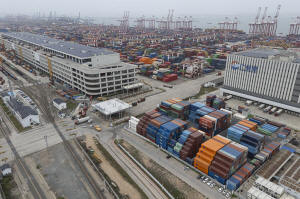Cheap parcels from China will no longer be duty-free. Here's what it
means for buyers and sellers
[May 01, 2025] ANNE
D'INNOCENZIO and DIDI TANG
NEW YORK (AP) — Consumers can expect higher prices and delivery delays
when the Trump administration ends a duty-free exemption on low-value
imports from China Friday.
The expiration of the so-called de minimis rule that has allowed as many
as 4 million low-value parcels to come into the U.S. every day — mostly
from China — is also forcing businesses that have built their models on
sourcing production in China to rethink their practices in order to keep
their costs down.
But some might actually benefit from the termination of the duty
exemption. For instance, companies that make their goods in the U.S. may
feel relief from the competition of cheap Chinese imports, and likely
experience a brighter sales outlook.
The move, which applies to goods originating from mainland China and
Hong Kong, comes on top of President Donald Trump's new tariffs totaling
145% on China. Beijing has retaliated with tariffs of 125% on the U.S.,
fueling a trade war between the world’s two largest economies. Sellers
are already seeing cautious consumers.
On Wednesday, Trump called the de minimis exemption “a big scam going on
against our country, against really small businesses.”
“We put an end to it,” he said.

What's the de minimis provision?
Introduced in 1938, the de minimis exception was intended to facilitate
the flow of small packages valued at no more than $5, the equivalent of
about $109 today. The threshold rose to $800 in 2016. But the rapid rise
of cross-border e-commerce, driven by China, has challenged the intent
of the decades-old customs exception rule.
Chinese exports of low-value packages soared to $66 billion in 2023, up
from $5.3 billion in 2018, according to a February report by the
Congressional Research Service. And the U.S. market has been a major
destination.
Former President Joe Biden proposed a rule last year that said foreign
companies can’t avoid tariffs simply by shipping goods that they claim
to be worth $800 or less. Trump tried in February to end the exception
but his initial order was called off within days when it appeared the
U.S. was not prepared to process and collect tariffs on the deluge of
parcels coming in.
What’s the impact on shoppers?
Consumers will face higher prices and delivery delays now that parcels
will go through a more complicated customs process to enter the U.S.
involving declaration and duty payment.
Businesses could factor tariffs into the final price, or they can list
them separately in the same way as sales taxes. For instance, Temu,
which is owned by the Chinese e-commerce company PDD Holdings, now lists
“import charges” that have reportedly doubled many items’ prices. (The
retailer also has a “local warehouse” option for some products, which
are shipped from within the U.S. and therefore avoids the import
charge.)
Meanwhile, Shein, now based in Singapore, has a checkout banner that
reads, “Tariffs are included in the price you pay. You’ll never have to
pay extra at delivery.”
Amazon says it’s not planning to display added tariff costs next to
product prices on its site — despite a report that sparked speculation
the e-commerce giant would soon show the new import charges, and the
White House has made fiery comments denouncing the purported change.

What about sellers and carriers?
Parcel carriers will be burdened with collecting duties, and the
paperwork to comply with the new rule could result not only in higher
prices but also delays and even disruptions to delivery, said Ram Ben
Tzion of the vetting platform Publican.
Major commercial carriers such as UPS and FedEx have said they are
well-equipped and prepared to collect duties on international parcels in
compliance with local laws, including the new U.S. rule.
Commercial carriers will be collecting 145% tariffs on declared values.
The U.S. Postal Service, a government agency that offers international
mail service, can choose either to charge a 120% tariff on low-value
packages or a flat fee of $100 per shipment, which is set to rise to
$200 on June 1.
[to top of second column] |

Shipping containers are seen ready for transport at the Guangzhou
Port in the Nansha district in southern China's Guangdong province
on April 17, 2025. (AP Photo/Ng Han Guan, File)
 The U.S. Customs and Border
Protection says it "stands ready to fully implement the restrictions
on de minimis shipments and collect all revenue owed for these
shipments on May 2, 2025.”
However, experts have expressed concerns that the surge in the
workload could be a serious challenge.
In January and February, more than 70% of the 216 million packages
coming into the U.S. were originating from China, according to CBP.
What's the impact on businesses?
Those that relied on the de minimis exemption are now having to
adjust.
John Curry, owner and chief executive officer of HAPARI
International, an Arizona-based swimwear business, had switched from
bulk shipping to de minimis shipping about six months ago to improve
cash flow, speed up delivery, and eventually eliminate U.S.-based
warehousing. His company makes its products in China and sells them
directly to U.S. customers via its own online storefront.
Curry said he planned to stay the course and pay the additional 145%
duty — one parcel at a time — while waiting for the U.S. and China
to work out a more sustainable approach.
“There has to be a solution because both countries cannot survive
this way,” Curry said.
Izzy Rosenzweig, founder and CEO of the logistic company Portless,
helps businesses like HAPARI to ship goods from its China-based
warehouse using the de minimis exemption. He says U.S. businesses
are likely to stay in China for now given the competitiveness of the
manufacturing base and of the supply chain in China but can be
expected to raise prices.

And while businesses with good profit margins probably will continue
to ship from China, those that run on razor-thin profit margins are
likely to “go local”, setting up more U.S.-based warehouses to
defray tariff costs, he said.
Who benefits?
Trade groups representing flag manufacturers and bike dealers said
they expect to benefit from the end of the duty exemption.
In written comments on the U.S. Trade Representative portal, for
instance, the Flag Manufacturers Association of America said its
members have been bombarded by an onslaught of American flag imports
mostly made in China that are falsely marketed and significantly
discounted. The group cited a drop of 25% to 35% in industrywide
sales of American-made U.S. flags last year.
Larry Severini, CEO of Embroidery Solutions Manufacturing LLC, which
makes the star fields for U.S. flag manufacturers, had to shutter
one of his two plants in South Carolina earlier this year because of
stiff competition from cheap imports. He noted sales have fallen 20%
since 2021 in part because of the de minimis exemption.
“We need duties to level the playing field to make it fair,”
Severini said.
The National Bike Dealers' Association's Heather Mason said shoppers
often check out $2,000 bike from a trusted brand like Trek and then
they find a lookalike online for $1,200 — often with lower quality
parts, no warranty, no service, and safety risks.
“Reputable brands follow strict safety, labor, and warranty
standards,” she said in an email to The Associated Press. “De
minimis allowed bad actors to dodge these."
——
Tang reported from Washington.
All contents © copyright 2025 Associated Press. All rights reserved
 |